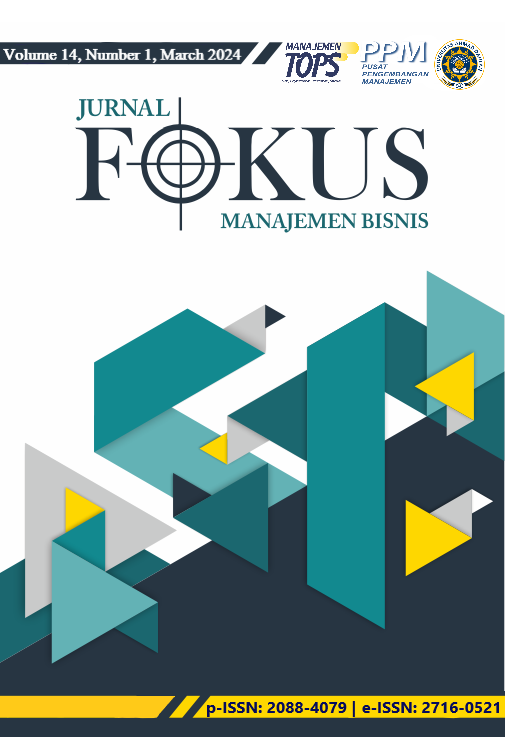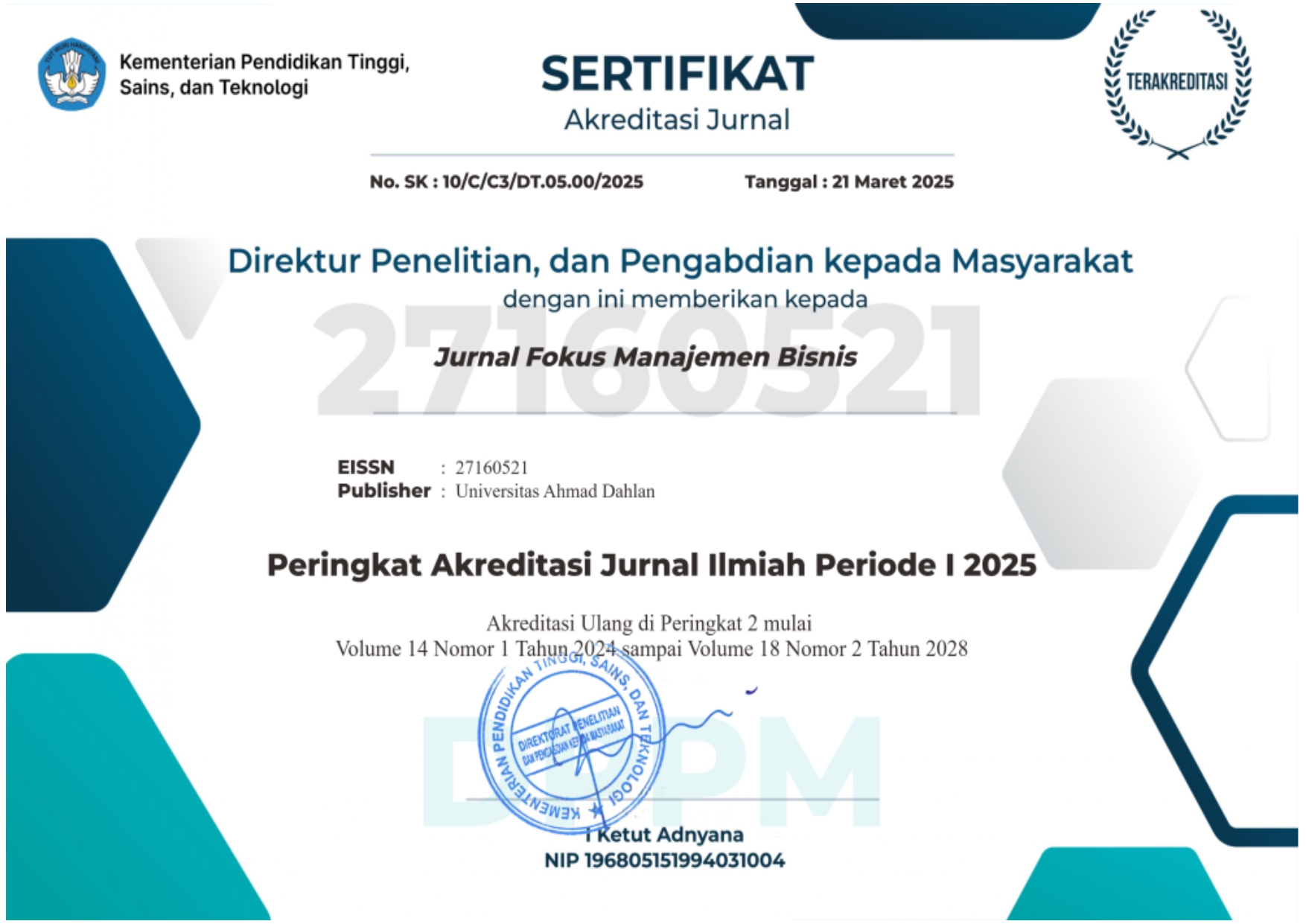Cost efficiency analysis of logistics and warehouse business
DOI:
https://doi.org/10.12928/fokus.v14i1.9979Abstract
Cost efficiency is a key focus in various aspects of a company's operational activities, and the supply chain plays an important role in achieving this goal. To better understand how the supply chain may affect cost-effectiveness, this study examines just-in-time, total quality management, and performance measurement systems in the context of Kosambi Warehouse Area, Tangerang, which involves collecting primary and secondary data using a quantitative approach. A total of 138 respondents were selected using a simple random sampling technique. SPSS software was used to analyze the data. The findings demonstrate that just-in-time has a negative and significant effect on cost efficiency. However, total quality management has a positive and significant influence on cost efficiency. The performance measurement system has a positive and significant influence on cost efficiency.
References
Abbas, J. (2020). Impact of total quality management on corporate green performance through the mediating role of corporate social responsibility. Journal of Cleaner Production, 242, 118458. https://doi.org/10.1016/j.jclepro.2019.118458
Abdurahimovna, C. D., & Sultanbekovna, M. M. (2022). Cost and accounting concepts in accounting and their accounting. Global Scientific Review, 4, 21–26.
Agarwal, A. (2021). Investigating design targets for effective performance management system: applying balance scorecard using QFD. Journal of Advances in Management Research, 18(3), 353–367. https://doi.org/10.1108/JAMR-05-2020-0075
Albloushi, B. (2023). Total quality management practices and corporate sustainable development in manufacturing companies: The mediating role of green innovation. Management Research Review, 46(1), 20–45. https://doi.org/10.1108/MRR-03-2021-0194
Alzoubi, H. M., In’airat, M., & Ahmed, G. (2022). Investigating the impact of total quality management practices and six sigma processes to enhance the quality and reduce the cost of quality: The case of Dubai. International Journal of Business Excellence, 27(1), 94–109. https://doi.org/10.1504/IJBEX.2022.123036
Balkhi, B., Alshahrani, A., & Khan, A. (2022). Just-in-time approach in healthcare inventory management: Does it work ? Saudi Pharmaceutical Journal, 30(12), 1830–1835. https://doi.org/10.1016/j.jsps.2022.10.013
Belhadi, A. (2021). Manufacturing and service supply chain resilience to the COVID-19 outbreak: Lessons learned from the automobile and airline industries. Technological Forecasting and Social Change, 163. https://doi.org/10.1016/j.techfore.2020.120447
Chen, R., Lee, Y. D., & Wang, C. H. (2020). Total quality management and sustainable competitive advantage: Serial mediation of transformational leadership and executive ability. Total Quality Management & Business Excellence, 31(5–6), 451–468. https://doi.org/10.1080/14783363.2018.1476132
Chi, O. H., Gursoy, D., & Chi, C. G. (2020). Tourists’ attitudes toward the use of artificially intelligent (AI) devices in tourism service delivery: Moderating role of service value seeking. Journal of Travel Research, 61(1), 170–185. https://doi.org/10.1177/0047287520971054
Chiarini, A. (2020). Industry 4.0, quality management, and TQM world. A systematic literature review and a proposed agenda for further research. The TQM Journal, 32(4), 603–616. https://doi.org/10.1108/TQM-04-2020-0082
Damasceno, B. (2020). Hypothesis testing BT research on cognition disorders: Theoretical and methodological issues. Springer International Publishing.
Elvina, E., Anggraeni, S., Sasongko, S. N., & Erlandian, A. Y. (2022). The influence of total quality management (TQM) on quality cost efficiency and managerial performance and the implications for company performance. Indonesian Interdisciplinary Journal of Sharia Economics, 5(2), 459-480. https://doi.org/10.31538/iijse.v5i2.2161
Ewing, R., & Park, K. (2020). Basic quantitative research methods for urban planners. Taylor & Francis.
Frederico, G. F. (2020). Supply chain 4.0: Concepts, maturity and research agenda. Supply Chain Management, 25(2), 262–282. https://doi.org/10.1108/SCM-09-2018-0339
Frederico, G. F., Garza-Reyes, J. A., Kumar, A., & Kumar, V. (2021). Performance measurement for supply chains in the Industry 4.0 era: A balanced scorecard approach. International Journal of Productivity and Performance Management, 70(4), 789–807. https://doi.org/10.1108/IJPPM-08-2019-0400
Giannakis, M., Dubey, R., Vlachos, I., & Ju, Y. (2020). Supplier sustainability performance evaluation using the analytic network process. Journal of Cleaner Production, 247, 119439. https://doi.org/10.1016/j.jclepro.2019.119439
Green, K. W., Inman, R. A., Sower, V. E., & Zelbst, P. J. (2019). Impact of JIT, TQM and green supply chain practices on environmental sustainability. Journal of Manufacturing Technology Management, 30(1), 26–47. https://doi.org/10.1108/JMTM-01-2018-0015
Haekal, J., & Setiawan, I. (2020). Comparative analysis of raw materials control using JIT and EOQ method for cost efficiency of raw material supply in automotive components company Bekasi, Indonesia. International Journal of Engineering Research and Advanced Technology, 06(10), 76–82. https://doi.org/10.31695/ijerat.2020.3661
Hussein, M., & Zayed, T. (2021). Critical factors for successfully implementing the just-in-time concept in modular integrated construction: A systematic review and meta-analysis. Journal of Cleaner Production, 284, 124716. https://doi.org/10.1016/j.jclepro.2020.124716
Kamble, S. S., Gunasekaran, A., Ghadge, A., & Raut, R. (2020). A performance measurement system for industry 4.0 enabled smart manufacturing system in SMEs: A review and empirical investigation. International Journal of Production Economics, 229. https://doi.org/10.1016/j.ijpe.2020.107853
Karamouz, S. S., Kahnali, R. A., & Ghafournia, M. (2021). Supply chain quality management performance measurement: Systematic review. International Journal of Quality & Reliability Management, 38(2), 484–504. https://doi.org/10.1108/IJQRM-03-2019-0073
Khalfallah, M., & Lakhal, L. (2021). The relationships between TQM, TPM, JIT and agile manufacturing: An empirical study in industrial companies. The TQM Journal, 33(8), 1735–1752. https://doi.org/10.1108/TQM-12-2020-0306
Khan, S. A. R. (2021). Industry 4.0 and circular economy practices: A new era business strategies for environmental sustainability. Business Strategy and the Environment, 30(8), 4001–4014. https://doi.org/10.1002/bse.2853
Kraus, S., Rehman, S. U., & García, F. J. S. (2020). Corporate social responsibility and environmental performance: The mediating role of environmental strategy and green innovation. Technological Forecasting and Social Change, 160, 120262. https://doi.org/10.1016/j.techfore.2020.120262
Kula, E., Greuter, E., Deursen, A. V., & Gousios, G. (2022). Factors affecting on-time delivery in large-scale agile software development. IEEE Transactions on Software Engineering, 48(9), 3573–3592. https://doi.org/10.1109/TSE.2021.3101192
Kumar, P. (2021). Managing supply chains for sustainable operations in the era of industry 4.0 and circular economy: Analysis of barriers. Resources, Conservation and Recycling, 164. https://doi.org/10.1016/j.resconrec.2020.105215
Lahane, S., Kant, R., & Shankar, R. (2020). Circular supply chain management: A state-of-art review and future opportunities. Journal of Cleaner Production, 258, 120859. https://doi.org/10.1016/j.jclepro.2020.120859
Lambert, D. M., & Cooper, M. C. (2000). Issues in supply chain management. Industrial Marketing Management, 29(1), 65–83. https://doi.org/10.1016/S0019-8501(99)00113-3
Liao, S. (2023). Review of just-in-time material distribution scheduling for mixed flow assembly lines considering transfer vehicle handling energy consumption. Journal of Innovation and Development, 3(1), 126-131. https://doi.org/10.54097/jid.v3i1.8434
Liu, Z., & Nishi, T. (2020). Analyzing just-in-time purchasing strategy in supply chains using an evolutionary game approach. Journal of Advanced Mechanical Design, Systems, and Manufacturing, 14(5). https://doi.org/10.1299/jamdsm.2020jamdsm0070
Lohr, S. L. (2021). Sampling: Design and analysis. CRC Press.
Lopes, M. A., & Martins, R. A. (2021). Mapping the impacts of industry 4.0 on performance neasurement systems. IEEE Latin America Transactions, 19(11), 1912–1923. https://doi.org/10.1109/TLA.2021.9475625
Ma, B., Limierta, J., Teo, C. C., & Wong, Y. D. (2024). Unveiling consumers’ nonlinear evaluation of service performances in online food delivery: A quantitative Kano analysis. British Food Journal, 126(2), 834–863. https://doi.org/10.1108/BFJ-06-2023-0503
Msallam, A. A., Al Hila, A. A., Naser, S. S. A., & Al Shobaki, M. J. (2020). The effect of total quality management in achieving the requirements of quality of career among university colleges employees. International Journal of Academic Management Science Research (IJAMSR), 4 (10), 45-65.
Nudurupati, S. S., Garengo, P., & Bititci, U. S. (2021). Impact of the changing business environment on performance measurement and management practices. International Journal of Production Economics, 232, 107942. https://doi.org/10.1016/j.ijpe.2020.107942
Nugroho, A., Christiananta, B., Wulani, F., & Pratama, I. (2022). Exploring the association among just in time, total quality and supply chain management influence on firm performance: Evidence from Indonesia (doctoral dissertation, Universitas Ciputra).
Patrucco, A. S., Moretto, A., & Knight, L. (2021). Does relationship control hinder relationship commitment? The role of supplier performance measurement systems in construction infrastructure projects. International Journal of Production Economics, 233, 108000. https://doi.org/10.1016/j.ijpe.2020.108000
Phan, A. C., Nguyen, H. T., Nguyen, H. A., & Matsui, Y. (2019). Effect of total quality management practices and JIT production practices on flexibility performance. Empirical Evidence from International Manufacturing Plants, 11(11), 3093. https://doi.org/10.3390/su11113093
Reddivari, S., Bhowmik, T., & Hollis, C. (2019). Automated support to capture verbal just-in-time requirements via audio mining and cluster-based visualization. Journal of Industrial Information Integration, 14, 41–49. https://doi.org/10.1016/j.jii.2018.06.001
Sadriddinovich, J. T. (2023). Capabilities of SPSS software in high volume data processing testing. American Journal of Public Diplomacy and International Studies, 1(9), 82-86.
Saffar, N. A. G. A., & Obeidat, A. (2020). The effect of total quality management practices on employee performance: The moderating role of knowledge sharing. Management Science Letters, 10(1), 77-90. https://doi.org/10.5267/j.msl.2019.8.014
Sekaran, U. (2017). Metode Penelitian untuk Bisnis Pendekatan Pengembangan-Keahlian. Salemba Empat.
Shafiq, M., Lasrado, F., & Hafeez, K. (2019). The effect of TQM on organisational performance: Empirical evidence from the textile sector of a developing country using SEM. Total Quality Management & Business Excellence, 30(1–2), 31–52. https://doi.org/10.1080/14783363.2017.1283211
Sjödin, D., Parida, V., Jovanovic, M., & Visnjic, I. (2020). Value creation and value capture alignment in business model innovation: A process view on outcome-based business models. Journal of Product Innovation Management, 37(2), 158–183. https://doi.org/10.1111/jpim.12516
Sugiyono. (2019). E-book metode penelitian kuantitatif, kualitatif, dan R&D. Alfabeta.
Tine, B. P., Yalamanchili, S., & Kim, H. (2020). Tango: An optimizing compiler for just-in-time RTL simulation. In 2020 Design, Automation & Test in Europe Conference & Exhibition (pp. 157-162). IEEE.
Ye, Y., Suleiman, M. A., & Huo, B. (2022). Impact of just-in-time (JIT) on supply chain disruption risk: the moderating role of supply chain centralization. Industrial Management and Data Systems, 122(7), 1665–1685. https://doi.org/10.1108/IMDS-09-2021-0552
Yusuf, A., & Soediantono, D. (2022). Supply chain management and recommendations for implementation in the defense industry: A literature review. International Journal of Social and Management Studies, 3(3), 63-77. https://doi.org/10.5555/ijosmas.v3i3.142
Zhou, B., & Peng, T. (2017). Scheduling the in-house logistics distribution for automotive assembly lines with just-in-time principles. Assembly Automation, 37(1), 51–63. https://doi.org/10.1108/AA-04-2016-028
Downloads
Published
How to Cite
Issue
Section
License
Copyright (c) 2024 Rizka Amalia Nur Hasana, Setiyo Purwanto

This work is licensed under a Creative Commons Attribution-ShareAlike 4.0 International License.
Authors who publish with this journal agree to the following terms:Â
- Authors retain copyright and grant the journal right of first publication with the work simultaneously licensed under a Creative Commons Attribution License that allows others to share the work with an acknowledgment of the work's authorship and initial publication in this journal.
- Authors are able to enter into separate, additional contractual arrangements for the non-exclusive distribution of the journal's published version of the work (e.g., post it to an institutional repository or publish it in a book), with an acknowledgment of its initial publication in this journal.
- Authors are permitted and encouraged to post their work online (e.g., in institutional repositories or on their website) prior to and during the submission process, as it can lead to productive exchanges, as well as earlier and greater citation of published work (See The Effect of Open Access).







